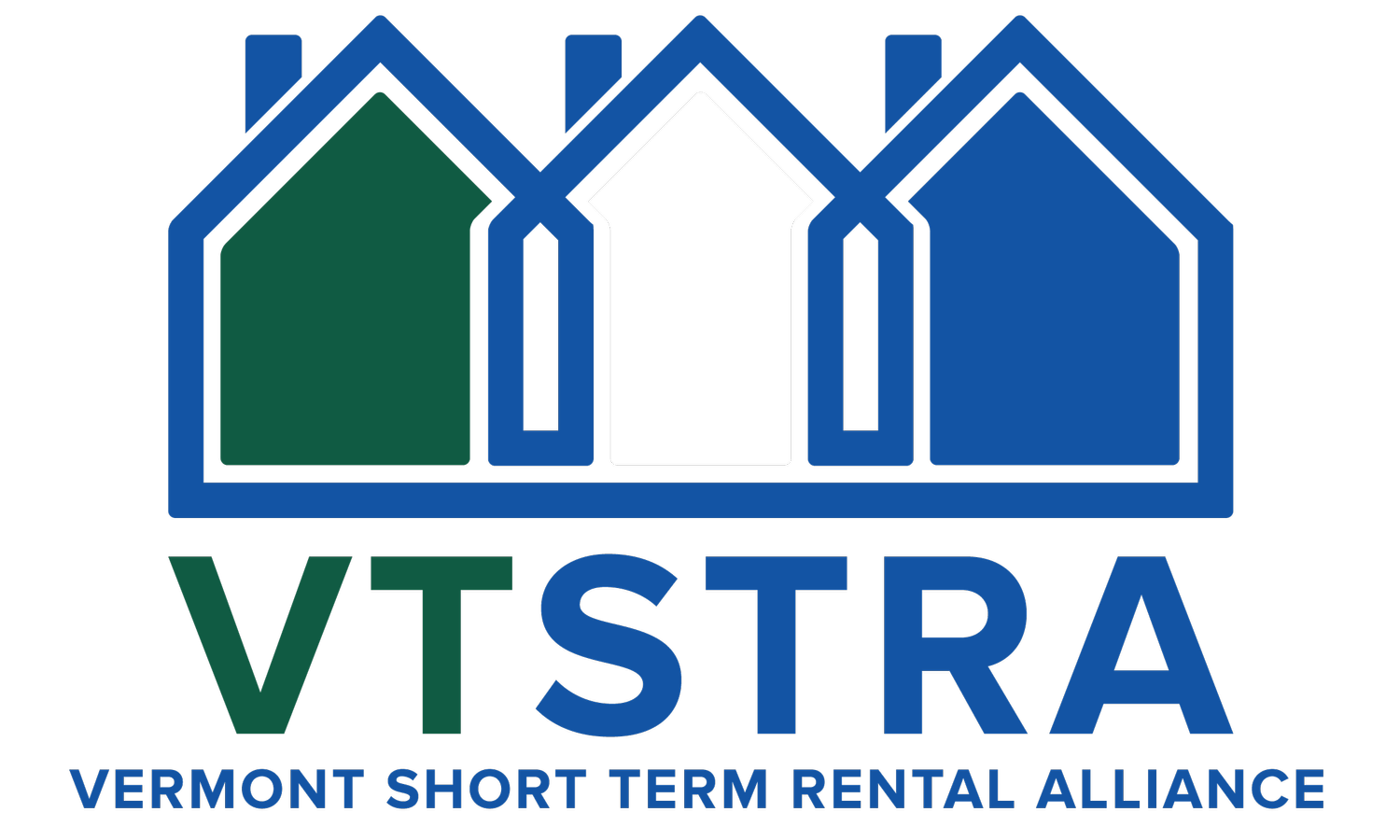
Facts about Short-Term Rentals
Quick STR Facts
Between January 2024 and July 2025, Vermont had an average of 11,016 whole-unit STRs. During this period, the number of active listings fluctuated from 10,090 to 11,770.
STRs represent ~3% of Vermont’s housing stock and ~65% of Vermont’s visitor capacity.
Over $1 billion in annual economic activity is generated by Vermont’s STRs.
More than 500,000 visitors stay at a Vermont STR each year, spending an average of $1,500 per visit at local businesses.
Vermont’s STR economy supports at least 6,000 local jobs.
The State is projected to receive over $65 million in tax revenue from STRs in 2025.
STR Definition
A “short-term rental” (STR) is defined by Vermont Statute under Act 10 (2018) as “a furnished house, condominium, or other dwelling room or self-contained dwelling unit rented to the transient, traveling, or vacationing public for a period of fewer than 30 consecutive days and for more than 14 days per calendar year.”
Other points of distinction:
Short-term renting is a residential activity. The act of renting in Vermont considers the property to be a “public building”, which requires it comply with State Building & Fire Codes.
A short-term rental cannot offer food service without a license from the Vermont Department of Health.
No more than 2 short-term rental units may operate on one property without being licensed as a Lodging Establishment by the Vermont Department of Health.
A “short-term rental” is often called a ‘vacation rental’ and can be advertised through popular online platforms like Airbnb and VRBO, other online or local travel agencies, or directly advertised by the owner or property management company.
A “short-term rental” is not a hotel, motel, inn, or bed & breakfast.
Demographics & Ownership
STR Ownership in Vermont
80% of owners operate 1 or 2 STR listings
50% of owners are full-time Vermont residents
55% of owners are over the age of 55 and are in or nearing retirement
63% of owners are women
25% of owners also own/manage separate annual rental properties
55% of Airbnb hosts say hosting has helped them afford their homes
STR Use in Vermont
90% of STRs are occupied by the owner each year
80% are available as a monthly furnished rental, supplying “medium-term” rentals for temporary workers, traveling professionals, and transitioning families
An alternative to hotels and inns, STRs offer what consumers demand: privacy, pet-friendly, family-friendly, contactless hospitality, longer stays, larger gatherings, unique experiences
Economic Impacts
Meals & Rooms Tax
In 2022, ~$51 Million of the MRT revenue came from STR reservations, and ~$54 Million in 2023
Local Option Tax
In 2022, Stowe STRs contributed ~$500,000 to the town’s budget in LOT revenue and Wilmington STRs added ~$200,000 to the town’s budget through the LOT
Employment & Jobs
>100 locally-owned vacation rental management businesses are employing Vermont residents in addition to publicly-owned management companies, like Vacasa and Evolve, that also employ ~200 Vermont residents
Visitor Spending
STR guests spend an average of $1,500 at local businesses during a 3-day stay. Over 450,000 visitors stay in Vermont STRs for an average of 4 days every year.
STR guests contribute ~$650 Million in annual visitor spending per year.
92% of Airbnb hosts say they recommend restaurants and cafes to guests.
56% of Airbnb hosts say they recommend cultural activities such as museums, festivals, and historical sites to guests.
On average, Airbnb guests say 41% of their spending occurs in the neighborhood where they stay.
Second Homeowner Spending
Second homeowners represent more than 40% of Vermont’s overall tourism purchases according to the 2017 Benchmark Report from the Vermont Department of Tourism & Marketing.
Housing Market Impacts
The Vermont Housing Finance Agency uses data from AirDNA to estimate the number of short-term rentals in every Vermont town.
STRs make up 3% of Vermont’s housing stock
15% of Vermont’s housing stock is “second home”
There are 3 types of STRs as they relate to the housing marketing impacts:
1 — STRs not suitable for long-term rental housing:
seasonal camps, vacation homes with part-time owner-occupancy, rooms without cooking facilities, yurts, “glamping” tents, etc.
2 — STRs constructed exclusively for short-term rental use:
new construction, converted buildings/spaces, etc.
3 — STRs previously used as long-term housing:
whole apartments and homes in which the landlord has pivoted from long-term rentals to short-term rentals for personal reasons
Independent Studies:
In 2023, STR Impact Studies were published by housing authorities in Maine and New Hampshire. Both reported that increased STR activity has had an insignificant effect on rent and home prices.
Vermont League of Cities & Towns published Vermont's Housing Crisis: 2022 Municipal Action Paper.
In-fill development, vacancy taxes, and Act 250 reform remain the top recommendations for improving housing affordability in Vermont.

